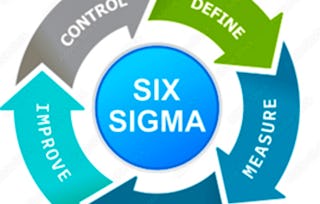This course is designed to guide you on how to prepare for the American Society for Quality Certified Six Sigma Black Belt (ASQ CSSBB) certification, a mark of quality excellence across industries.

Advanced Statistical Analysis and Tools

Advanced Statistical Analysis and Tools
This course is part of ASQ-Certified Six Sigma Black Belt (CSSBB) Exam Prep Specialization


Instructors: SkillUp
Included with
10 reviews
Recommended experience
What you'll learn
Identify the statistical analysis tools required for quality and process improvement in each phase of the DMAIC methodology.
Describe the statistical processes of each phase of the DMAIC methodology used for operational efficiency.
Apply statistical analysis tools for representing relationships, analyzing systems, and testing hypotheses.
Implement design experiments and apply statistical process control to streamline business processes.
Skills you'll gain
- Statistical Analysis
- Lean Methodologies
- Business Process
- Statistical Methods
- Six Sigma Methodology
- Statistical Process Controls
- Statistical Hypothesis Testing
- Risk Management
- Quality Improvement
- Data Collection
- Risk Analysis
- Kaizen Methodology
- Process Capability
- Process Improvement
- Process Analysis
- Sample Size Determination
- Skills section collapsed. Showing 8 of 16 skills.
Details to know

Add to your LinkedIn profile
See how employees at top companies are mastering in-demand skills

Build your subject-matter expertise
- Learn new concepts from industry experts
- Gain a foundational understanding of a subject or tool
- Develop job-relevant skills with hands-on projects
- Earn a shareable career certificate

There are 4 modules in this course
In this module, you will learn about the various statistical tools you can use for process analysis and data collection. The module delves into the statistical technique of measurement system analysis (MSA). You will also learn how to use graphical tools to construct and interpret diagrams and charts. You will be equipped with how the results of statistical studies are used to draw valid conclusions, the distribution methods relevant to probability, and the techniques used for process capability. Finally, you will learn to interpret the difference between short-term and long-term capabilities.
What's included
8 videos2 readings3 assignments1 discussion prompt
In this module, you will learn how to measure and model relationships between variables. You will explore the correlation coefficient, linear regression, and multivariate tools. The module also delves into applying the key concepts of hypothesis testing, such as the significance of testing, calculating sample size, and analyzing waste. You will become acquainted with techniques such as point and interval estimates and tests for means, variances, and proportions. Additionally, you will learn the analysis of variance (ANOVA) and goodness-of-fit (chi-square) tests and the techniques for analyzing and managing risk.
What's included
7 videos1 reading3 assignments1 discussion prompt
In this module, you will explore the key concepts of the design of experiments (DOE). You will also learn how to apply the principles of DOE, such as power, sample size, balance, repetition, replication, order, efficiency, randomization, blocking, interaction, confounding, and resolution. The module will take you through planning and evaluating different types of experiments in DOE and various types of Lean methods you can use for process improvement, like waste elimination, cycle-time reduction, Kaizen, and others. Additionally, the module focuses on statistical process control (SPC) and other controls that help to streamline business processes. Finally, you will learn how to sustain process improvements using methods like documentation, training, and evaluation.
What's included
5 videos1 reading2 assignments1 discussion prompt
This is a peer-review assignment based on the concepts taught in the Advanced Statistical Analysis and Tools course. In this assignment, you have been provided with a real-life scenario. You must explain how you can use process capabilities and their related metrics in process improvement.
What's included
1 video2 readings1 peer review
Earn a career certificate
Add this credential to your LinkedIn profile, resume, or CV. Share it on social media and in your performance review.
Explore more from Data Analysis
 Status: Free Trial
Status: Free Trial Status: Free Trial
Status: Free Trial Status: Free Trial
Status: Free Trial Status: Free Trial
Status: Free TrialKennesaw State University
Why people choose Coursera for their career

Felipe M.

Jennifer J.

Larry W.

Chaitanya A.
Learner reviews
- 5 stars
100%
- 4 stars
0%
- 3 stars
0%
- 2 stars
0%
- 1 star
0%
Showing 3 of 10
Reviewed on Mar 31, 2024
The course provides very good clarity on the complex concepts.
Reviewed on Oct 10, 2025
Excellent effort, Your analysis of Process Capability is very understandable. A small improvement: consider expanding on the key steps to make it stronger. Well done.

Open new doors with Coursera Plus
Unlimited access to 10,000+ world-class courses, hands-on projects, and job-ready certificate programs - all included in your subscription
Advance your career with an online degree
Earn a degree from world-class universities - 100% online
Join over 3,400 global companies that choose Coursera for Business
Upskill your employees to excel in the digital economy
Frequently asked questions
To access the course materials, assignments and to earn a Certificate, you will need to purchase the Certificate experience when you enroll in a course. You can try a Free Trial instead, or apply for Financial Aid. The course may offer 'Full Course, No Certificate' instead. This option lets you see all course materials, submit required assessments, and get a final grade. This also means that you will not be able to purchase a Certificate experience.
When you enroll in the course, you get access to all of the courses in the Specialization, and you earn a certificate when you complete the work. Your electronic Certificate will be added to your Accomplishments page - from there, you can print your Certificate or add it to your LinkedIn profile.
Yes. In select learning programs, you can apply for financial aid or a scholarship if you can’t afford the enrollment fee. If fin aid or scholarship is available for your learning program selection, you’ll find a link to apply on the description page.
More questions
Financial aid available,
¹ Some assignments in this course are AI-graded. For these assignments, your data will be used in accordance with Coursera's Privacy Notice.

